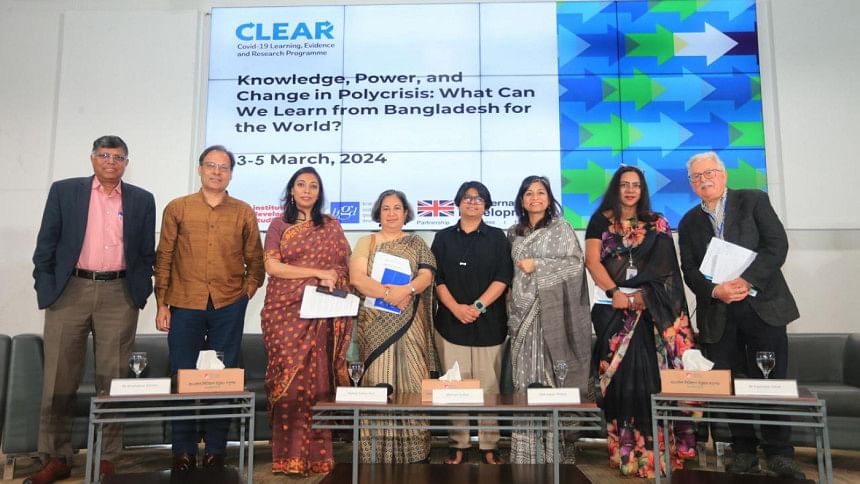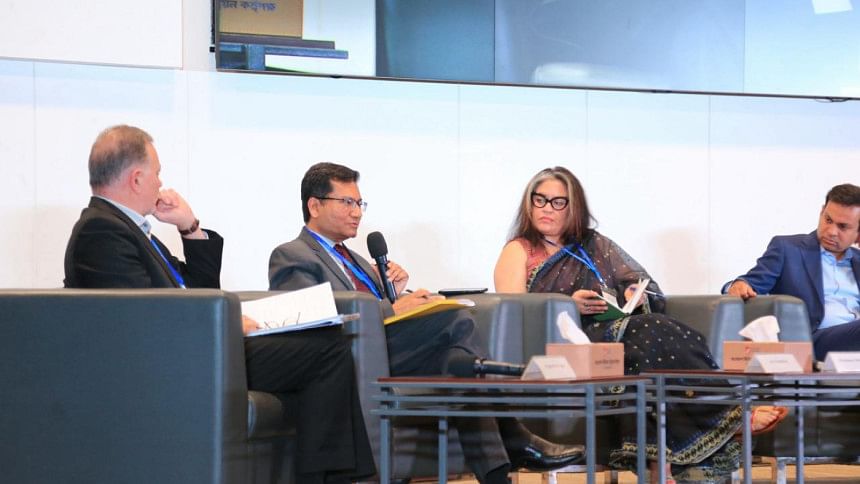COVID-19 Learnings: Is Bangladesh Leveraging Its Pandemic Experience?

"In a country where we manage by crisis, we discovered the true potential of our resilience and innovation during the COVID-19 pandemic." —Anir Chowdhury, Policy Advisor, Aspire to Innovate (a2i) programme of the Government of Bangladesh
Amidst a crisis, opportunities often emerge for innovation and change. COVID-19 provided such an opportunity to Bangladesh, testing the nation's resilience. The structural inequalities were laid bare by the crisis, prompting a re-evaluation of crisis management methods, including knowledge generation and utilisation. Bangladesh's approaches to the COVID-19 response included quickly adopting digital technologies, mobilising local communities, and placing greater emphasis on using data to guide policy decisions. Yet, the pivotal question remains: Is Bangladesh leveraging its pandemic experience to weather the next crisis? Will the approaches born out of the pandemic last?

These questions were raised at the final conference of the Covid-19 Learning, Evidence and Research (CLEAR) programme, held at the Bangladesh Investment Development Authority (BIDA) conference hall from March 3rd to 5th. The event, titled "Knowledge, Power, and Change in Polycrisis: What Can We Learn from Bangladesh for the World?", was co-hosted by CLEAR, the BRAC Institute of Governance and Development (BIGD) of Brac University, and the Institute of Development Studies (IDS) of the University of Sussex. The conference sought to merge local experiences with global development priorities, highlighting Bangladesh's role in shaping more effective crisis response strategies worldwide.
From Poverty to Vulnerability: Rethinking Social Protection Programmes
COVID-19 was not just a health crisis but also an economic one. Many families, once financially stable, suddenly found themselves struggling. This economic turmoil reshaped poverty, pushing more people into a new class, the "new poor". Urban areas, in particular, saw a sharp spike in poverty, aggravated by rising inflation and job losses, especially among returning migrant workers. This upheaval took a heavy toll on mental health, particularly for women and marginalised groups, who faced added stress, shame, and discrimination in asking for financial assistance. The conference highlighted the urgency for safety nets that can adapt quickly, for example, to prevent people from slipping into poverty. This shift challenges old ways of fighting poverty and calls for proactive measures to keep vulnerable communities afloat.
Social protection services in Bangladesh suffer from many challenges. To begin with, Bangladesh struggles to accurately identify and assist those in need due to data deficiencies. Transparency issues and corruption further hinder effective distribution, while emergency aid often falls short, failing to ensure long-term recovery. COVID-19 painfully exposed these deficiencies. It also helped us realise that addressing discrimination in our systems is crucial for fair access to dignified assistance. Conference recommendations stressed innovative targeting methods and debated the need for alternative interventions, such as rethinking microcredit programmes, especially in sectors like agriculture, to break cycles of subsistence.

A Deep Learning Loss: Lost Generation Amidst COVID-19
The COVID-19 crisis laid bare a glaring weakness in Bangladesh's education system: a widening learning gap. School closures caused a surge in learning poverty as students struggled without regular classroom instruction, and the poorer students suffered the most. Dropout rates soared due to financial strains, pushing some students into child labour or marriage, which also increased reluctance among the dropouts to return to school.
This crisis demanded a rapid shift towards remote learning. Bangladesh implemented a new curriculum and trained teachers through digital methods. However, this response highlighted the stark digital divide, leaving many students behind, especially those who were poor. Teachers' adaptability also emerged as a critical factor, underlining the need for comprehensive training to navigate the new curriculum.
Role of Digitalisation in Bangladesh's Pandemic Response
In the last 15 years, Bangladesh's strides in telecommunications have achieved coverage in almost all areas, paving the way for improved service delivery, especially in remote regions. The pandemic accelerated digitalisation in sectors like healthcare, education, and public services. For example, the private health sector saw a surge in the adoption of digital health platforms for remote consultations. While this shift offers efficiency and accessibility, it highlights challenges like digital disparities and privacy concerns.

Discussions at the conference emphasised the need for user-friendly, multilingual interfaces in health platforms that address diverse needs and privacy concerns. Digital divides pose another hurdle, deepening social exclusion, especially for marginalised groups. Establishing trust in digital services is crucial for equitable access, ensuring inclusivity, and addressing power imbalances.
Data: A Powerful Tool to Drive Policymaking
Amid the COVID-19 chaos, data became a guiding light for policymakers and health experts. However, without robust pre-pandemic data, fully grasping the pandemic's impact, especially on education, remained a challenge. Limited access to data in Bangladesh, particularly those that are politically sensitive, hinders in-depth policy analysis. Developing swift data collection methods is vital to respond effectively to crises and understand their repercussions promptly.
Data accessibility is crucial for informed decision-making. This need was acutely felt during the pandemic, especially for marginalised groups like the lower middle class. Swift data analysis enables more effective crisis responses and enhances understanding of political dynamics, paving the way for better policy formulation and intervention strategies.
Are Feedback Mechanisms Effective in Crisis Management?
During the COVID-19 pandemic, the government of Bangladesh, like many others, utilised feedback mechanisms like the 333 hotline and the Surokkha app for crisis management. These tools allowed citizens to report symptoms, register for vaccines, and express service-related concerns. These mechanisms improved communication between citizens and the government, through its rapid development and positive public response. However, it was also argued that the variety of platforms caused confusion, and the feedback's impact on policy and service improvement was questionable. Despite these issues, adopting feedback mechanisms represents a notable move towards more responsive governance, sparking discussion on their effectiveness in crises and improving citizen-state engagement.
Is Bangladesh Learning from Crises?
Reflection on lessons learned is vital for Bangladesh's future crisis management. Historical challenges persist, urging a more systematic crisis approach. Though innovation flourished during the pandemic, progress often reverted post-crisis. Structural changes are needed for more effective crisis handling. Openness to diverse perspectives fosters innovative solutions, but political restrictions stifle such dialogue.
Limited access to data hampers in-depth policy analysis, hindering understanding of political dynamics. However, the pandemic also showed that collaboration among local research institutions is essential for a unified approach to societal challenges, fostering knowledge-based coalitions for collective progress.
Informal networks and community initiatives play a crucial role in crisis management. Despite their proven effectiveness, policy frameworks often overlook them. Integrating community-based strategies is vital for more inclusive and effective responses to challenges, urging a shift in how solutions are conceived and implemented.

A proposal for a knowledge platform beyond COVID-19 was announced during the final speech. This platform aims to share research and data from various crises, supporting ongoing studies and addressing issues like digital exclusion. The CLEAR programme seeks to be a resilient crisis response tool, fostering trust and collaboration among knowledge institutions. Strengthening local networks will enhance global collaboration, facilitating a more efficient response to crises through collective knowledge and cooperation.

 For all latest news, follow The Daily Star's Google News channel.
For all latest news, follow The Daily Star's Google News channel. 



Comments